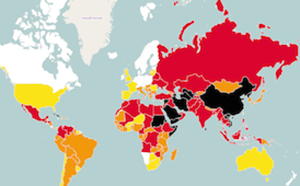
PARIS (Reporters Without Borders/Pacific Media Watch): Tonga, which has held its first democratic elections in 2010 and again last November, has made the strongest gains of any Pacific Islands nation in the 2015 Reporters Without Borders (RSF/RWB) World Press Freedom Index.
But globally, world press freedom has been in decline.
Thanks to an independent press, which has established its role as a counterweight to the government, the Polynesian kingdom of Tonga has risen an "enviable" 19 places to 44th overall.
Fiji, which held its first general election since the 2006 military coup in September, has also made strong gains. It rose 14 places to 93rd.
The top country in the Pacific Islands Forum region was New Zealand, which rose 3 places to 6th globally, even though its overall score declined by 1.51 points Australia also rose 3 places to 25th, also with a slight decline in its scorecard.
The RSF World Press Freedom Index ranks the performance of 180 countries according to a range of criteria that includes media pluralism and independence, respect for the safety and freedom of journalists, and the legislative, institutional and infrastructural environment in which the media operate.
Top of the list, as so often, are three Scandinavian countries - Finland, which has been in first place for five years in succession, followed by Norway and Denmark. At the other end of the scale, Turkmenistan, North Korea and Eritrea, in last place, were the worst performers.
France is ranked 38th (up one place), the United States 49th (down three places), Japan 61st (down two places), Brazil 99 (up 12 places), Russia 152 (down four places), Iran 173rd (unchanged) and China 176th (down one place).
The RSF World Press Freedom Index highlights the worldwide deterioration in freedom of information in 2014. Beset by wars, the growing threat from non-state operators, violence during demonstrations and the economic crisis, media freedom is in retreat on all five continents.
The indicators compiled by Reporters Without Borders are incontestable, says RSF.
"There was a drastic decline in freedom of information in 2014. Two-thirds of the 180 countries surveyed for the 2015 World Press Freedom Index performed less well than in the previous year," the RSF report said.
"The annual global indicator, which measures the overall level of violations of freedom of information in 180 countries year by year, has risen to 3,719, an 8 percent increase over 2014 and almost 10 percent compared with 2013.
The decline affected all continents."
The European Union-Balkans region recorded the biggest fall between the 2014 and 2015 editions.
"This disturbing trend reflects a two-fold phenomenon: the excesses of some member countries on the one hand and the inability of EU mechanisms to contain them on the other. The region that is bottom of the freedom of information list, North Africa and the Middle East, this year once again contained information 'black holes'.
"Comprising entire regions, these are controlled by non-state groups in which independent information simply does not exist."
Some key performances:
Key falls
Andorra (32nd), the sharpest fall, has paid the price for the lack of independence of its media from financial, political and religious interests.
It fell by 27 places as a result of the many conflicts of interests and the great difficulty experienced by journalists in covering the activities of Andorran banks, coupled with the lack of any legal protection for freedom of information, such as the confidentiality of journalists’ sources.
In the Asia-Pacific region, East Timor (103rd) fell by 26 places. The creation of a state-run press council and the adoption of a contested code of ethics in October 2013 have been a disappointment.
In the Americas, the United States (49th, down three places) continues its decline.
In 2014, The New York Times journalist James Risen came under government pressure to reveal his sources. Although the Obama administration backed away in that case, it continues its war on information in others, such as WikiLeaks.
Key rises
There are few of these. Mongolia (54th) rose 34 places, the Index’s biggest jump, says the RSF report.
The long-running political crisis in Madagascar (64th) came to an end with the election of Hery Rajaonarimampianina as president in January 2014 and the departure of the information minister.
This democratic transition eased the previous polarisation and boosted the country by 17 places. Yet some subjects remain taboo, such as the financial monopolies in the hands of leading political figures.
The RSF World Press Freedom Index summary
The full interactive Index table
This work is licensed under a Creative Commons Attribution-NonCommercial 3.0 New Zealand Licence.




